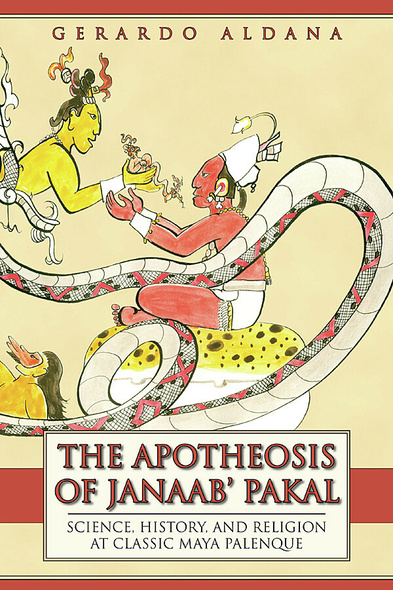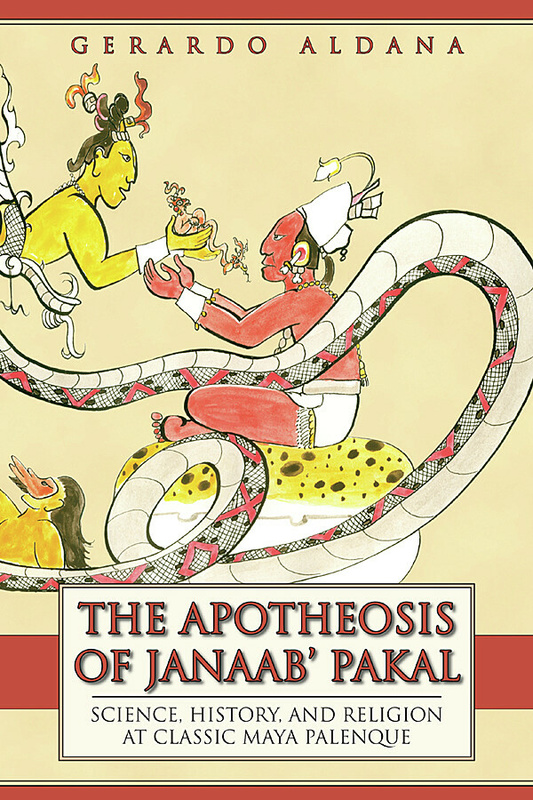The Apotheosis of Janaab' Pakal
Science, History, and Religion at Classic Maya Palenque
SERIES:
Mesoamerican Worlds
University Press of Colorado
The Apotheosis of Janaab' Pakal takes up anew the riddles within a number of Maya hieroglyphic inscriptions first recognized by Floyd Lounsbury. Gerardo Aldana unpacks these mathematical riddles using an approach grounded in a reading of the texts made possible by recent advances in decipherment. Using a history of science methodology, he expands upon (and sometimes questions) the foundational work of archaeoastronomers.
Aldana follows three lines of investigation: a reading of the hieroglyphic inscriptions of the Classic period (a.d. 250-900), mathematical analysis to recover Classic Maya astronomical practice, and a historiography of Maya astronomy. Quoted hieroglyphs appear throughout the text for cross-examination. Aldana reveals the social and political context of Maya astronomy by explicating the science and calendrical calculations found in the tablets of the Temple of Inscriptions and the Cross Group from the city of Palenque. He offers a compelling interpretation of an 819-day count, demonstrating its utility as an astronumerological tool that Maya scribes used to simplify complex calculations.
During troubled times in Palenque, Aldana contends, Kan Balam II devised a means to preserve the legitimacy of his ruling dynasty. He celebrated a re-creation of the city as a contemporary analogue of a mythical Creation on three levels: monumental construction for a public audience, artistic patronage for an elite audience, and a secret mathematical astronomical language only for rulers-elect. Discussing all of these efforts, Aldana focuses on the recovery of the secret language and its historical context.
Aldana follows three lines of investigation: a reading of the hieroglyphic inscriptions of the Classic period (a.d. 250-900), mathematical analysis to recover Classic Maya astronomical practice, and a historiography of Maya astronomy. Quoted hieroglyphs appear throughout the text for cross-examination. Aldana reveals the social and political context of Maya astronomy by explicating the science and calendrical calculations found in the tablets of the Temple of Inscriptions and the Cross Group from the city of Palenque. He offers a compelling interpretation of an 819-day count, demonstrating its utility as an astronumerological tool that Maya scribes used to simplify complex calculations.
During troubled times in Palenque, Aldana contends, Kan Balam II devised a means to preserve the legitimacy of his ruling dynasty. He celebrated a re-creation of the city as a contemporary analogue of a mythical Creation on three levels: monumental construction for a public audience, artistic patronage for an elite audience, and a secret mathematical astronomical language only for rulers-elect. Discussing all of these efforts, Aldana focuses on the recovery of the secret language and its historical context.
The Apotheosis of Janaab' Pakal proposes original and provocative interpretations of some of the most important hieroglyphic texts of the Classic Maya [and] substantially enriches our understanding of the Maya elite intellectual culture by exploring the relationships between astronomical/mathematical lore and the mythic foundations of kingship at Palenque.'
- Matthew Looper, Department of Art and Art History, California State University, Chico
[Aldana] uses novel techniques to combine ancient Maya mythology, astronumerology, science, astronomy, iconography, religion, and epigraphy to gain new insight into Classic Maya political and elite religious thought. . . . He unmasks the 819-day count and demonstrates its usefulness as an astronumerological tool. . . . Aldana applies a history of science approach and convincingly places astronumerology in political, religious, and social context.'
- Grant Aylesworth, Department of Anthropology, University of New Brunswick
...[A] complex, carefully argued, and convincing reassessment of Maya archaeoastronomy, cosmology, and writing....This new analysis reveals the historically contextualized human agency of Maya kings and provides a more sophisticated description of the functions of Maya astronomers.'
- C.C. Colb, CHOICE Magazine'Aldana has constructed an intriguing explanation for the invention, deployment, and historical associations of the 819 day count.'
- Clemency Coggins, Journal of the History of Astronomy
Gerardo Aldana is an assistant professor in the Department of Chicana and Chicano Studies at the University of California, Santa Barbara.





